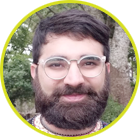Meet PLOS ONE Author Augusto Cardoso-dos-Santos
Augusto Cardoso-dos-Santos is a PhD student at Universidade Federal do Rio Grande do Sul, Porto Alegre, Rio Grande do Sul, Brazil
What first drew you to your field of research?
Genetics is exciting because its code unites practically all life on Earth. In my life, in particular, Genetics went from a simple calculus theme in high school and evolved in college to something that helped me to understand myself and the life around me. And she was everywhere: from the comic to my twin friends, from the soap operas to the hospitals! I have got a crush on “her” since then.
What is your particular area of research, and why is it important?
Epidemiology and Population Medical Genetics are my particular areas of research. I believe they are important areas because they help to determine strategic public health points, and especially the second helps to understand that a particular genetic characteristic (we can call it “phenotype”) may be rare individually, but they may reach high frequencies in certain populations who need research and care.
Has your (and your peers’) work expanded discussion in the scientific community or the broader public?
Yes! In our study, we show, among others, that the twinning rates in Brazil have increased significantly in some places of the country. We have discussed this work with authorities related to assisted reproduction in Brazil and with academic community in scientific meetings, but the public has also been interested in the subject (an example can be seen [here]). I think this is a key point of any research that I’m going to do in life: make it attractive to as many people as possible.
Twin Peaks: A spatial and temporal study of twinning rates in Brazil – PLOS ONE, July 2018
Is your research interdisciplinary? If so, how crucial are structures that support interdisciplinary review to the publication of your research?
Yes, this work specifically has a bit of Epidemiology, Geography, Sociology, Genetics and even Pop Culture! I believe that interdisciplinarity is important not only to give sex appeal to scientific work but also to keep Science as an institution that actually helps solve real problems of real people (not only to justify the salaries of scientists). That’s why we chose an interdisciplinary journal to publish our work. I think the best ideas usually come out when we start to think out of the box (and when we are taking a shower).
At what time in your career did you start thinking about Open Science, and why is it important to you?
Since scientific initiation program. At this time, I saw Science in a very utopian and almost romantic way and it was very frustrating when I heard that, in many cases, we needed to pay to publish what was already very expensive to discover and, to read, people also had to pay a high price. I even questioned my career after that! But at the same time, I’ve heard of some initiatives (such as Open Science) of democratization and dissemination that made me more relaxed – but still aware that much needs to be different.
In summary, what drives you in your career in science?
The respect for doubt.
Read more of Augusto Cardoso-dos-Santos’ Open Access publications:
Population medical genetics: translating science to the community – Genetics and Molecular Biology

